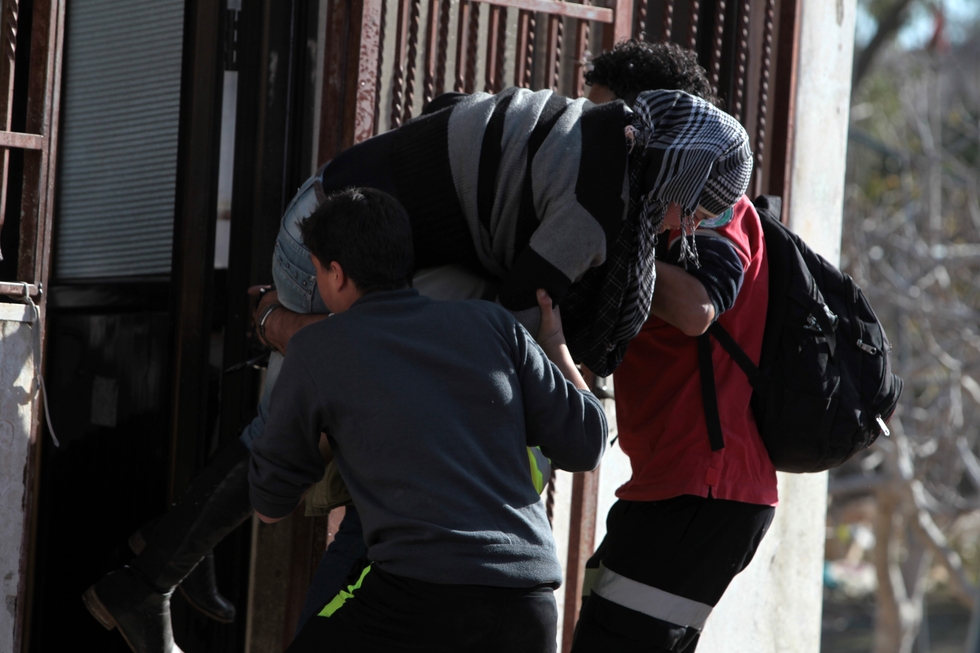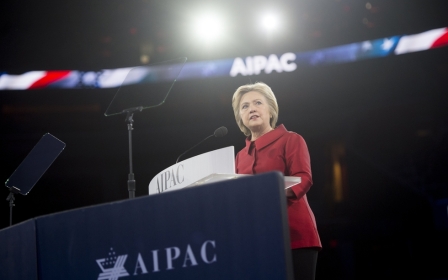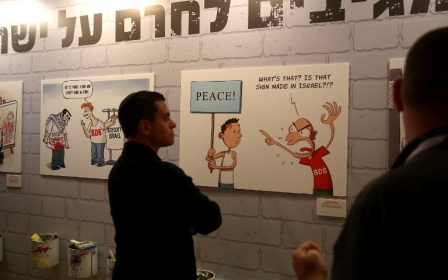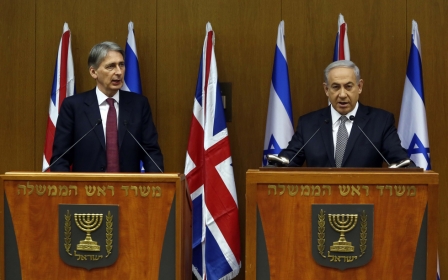Why Israel fears nonviolent resistance

The growing international Boycott, Divest and Sanctions (BDS) movement is becoming the major target for Israel diplomatically, while at home it is the whistle-blowers and truth-tellers who are being most savagely attacked. Special venom is reserved for them.
In the West Bank, communities under occupation have been increasingly responding to land grabs, house demolitions and arbitrary arrests by organising regular and patient sit-ins and demonstrations, with occasional more high-profile projects, like the setting up of the Bab al-Shams tented village.
To these actions, Israel reacts with routine violence – despite the fact that the ensuing scenes are viewed worldwide on social media, over which Israel has no control. The West Bank village of Bil’in is probably the best known centre of nonviolent resistance, thanks in part to the prize-winning film 5 Broken Cameras.
Speaking last year in the US, Iyad Burnat, leader of the Bil’in resistance group, said the beauty of such actions is that they involve the whole community, building social cohesion and sustaining morale, while bringing in Israeli and international activists who act as messengers to the outside world.
He stressed the importance of always finding new, creative ideas to attract media coverage. Despite the losses in his small village (42 deaths over the last 10 years, mostly children, and many injured, including his son) he can point to hard-won victories in the shape of land regained and restrictions on settlement growth. Such victories are inspirational to other communities across the West Bank, where there is a growing network of loosely coordinated groups.
The village of Nabi Saleh, about 20 kilometres northwest of Ramallah, has for years resisted the seizure of its land and water by the nearby illegal settlement of Halamish. Local organiser Manal Tamimi has been hospitalised twice, once after a tear gas attack, once when her leg was fractured by an Israeli bullet. Other family members have suffered.
Her cousin Bassem Tamimi was designated a Prisoner of Conscience by Amnesty International in 2011. Her young relative Mustafa Tamimi died when an IDF soldier fired a tear gas canister at his head at close range. Many others in the village have lost a close relative during nonviolent protests.
Manal was due to come to the UK in early May on a speaking tour organised by the Palestine Solidarity Campaign and Action 4 Palestinian Children, including a meeting at the House of Common on 11 May. The invitation sparked what appears to be a concerted attempt to stop her speaking abroad.
In March, she was arrested and interrogated and only released after the payment of 4000 shekels (about $1050). Manal sees this widespread practice of extracting (for them) such large sums as both a business and a punishment. “It’s kind of paying the price for the weapons they are using to kill us,” she says. “We should refuse to pay... But as a mother of children, I couldn’t say no, despite it being against my principles.” Of her supposed crimes, she says it is not about violence: “It’s about being Palestinian, staying on your land. By this determination that you won’t leave your land you are fighting the occupation – and you deserve to be punished.”
In addition, the threat of a long jail sentence hangs over her, as it does over all activists, however nonviolent. During her last interrogation she was told, ominously, that the Israeli authorities have a "secret file" on her. This means she could be tried without her lawyer having access to any of the evidence against her and be sentenced to an open-ended period of "administrative detention".
You can't leave
More recently, the Israel Advocacy group, a truly crackpot organisation even by Hasbara standards, took it upon themselves to contact and bully the groups hosting Manal’s speaking tour, on the grounds that – yes you guessed it – she is a dangerous anti-Semite.
The group believes that all of the West Bank is part of Israel and claims that “the ‘Palestinians’ are... not indigenous to the land, the majority are recent migrants attracted by economic opportunities created by the Zionists.” Ungrateful and disruptive infiltrators, in fact, in a foreign land!
More worrying for the future of democracy in the UK is the withdrawal last week of the visa that Manal had been granted, on vaguely technical grounds. It is impossible to know what has been going on behind the scenes. One can only hope that the UK government’s decision was not based on "information" provided by such a grotesquely racist organisation as Israel Advocacy.
Unfortunately, experience has shown that our government is highly vulnerable to Zionist pressure. One remembers Michael Gove as Minister of Education attempting to stop school children attending a Palestinian cultural festival in 2011, following messages he received from the Board of Deputies of British Jews, and Theresa May as Home Secretary trying unsuccessfully to deport Israeli Palestinian speaker Sheikh Raed Salah, following correspondence with the Zionist Community Security Trust.
Israel’s determination to use all its political and military clout to stifle the voices of dissent is understandable. An obligatory destination on any government-sponsored tour of Israel is the town of Sderot, where visitors are invited to empathise with the inhabitants who live in fear of rockets from Gaza. Few casualties may have resulted, but life must definitely be more fraught than it is in Tel Aviv, where the population enjoys its thriving cosmopolitan cafe culture, undisturbed.
Leaving aside the legality or otherwise of armed resistance to military occupation, Israel desperately needs those rockets. It has to show the world that it is the victim, not the perpetrator of violence. Imagine if not a single missile were fired, not even a stone thrown at a military vehicle. No fig leaf would remain to mask the blatant brutality and expansionism of the occupation.
There are hints that unarmed resistance could be taken up as the basis of a third intifada throughout the Occupied Territories. Fatah leader Marwan Barghouti, currently serving life imprisonment in Israel, is said to be acting as a mediator to bring in all political factions to radically re-think the most effective resistance strategy.
Actions would be focused on impeding access to the illegal settlements and damaging their infrastructure, such as electricity, telephone and internet, as well as organising mass protests across Jerusalem. However, it seems that such a coordinated approach would have to await the departure of President Abbas as head of the Palestinian Authority. For the time being, it will be up to the grass roots to continue the struggle.
- Hilary Wise is a writer, an academic and an activist. She also was editor of Palestine News for eight years.
The views expressed in this article belong to the author and do not necessarily reflect the editorial policy of Middle East Eye.
Photo: Palestinian activist Manal Tamimi (top) is carried by friends into a house after she was shot in the leg with rubber bullets by Israeli border guards in the West Bank village of Nabi Saleh during a protest against the expansion of Jewish settlements in Palestinian land on 27 December, 2013 (AFP).
Middle East Eye propose une couverture et une analyse indépendantes et incomparables du Moyen-Orient, de l’Afrique du Nord et d’autres régions du monde. Pour en savoir plus sur la reprise de ce contenu et les frais qui s’appliquent, veuillez remplir ce formulaire [en anglais]. Pour en savoir plus sur MEE, cliquez ici [en anglais].





